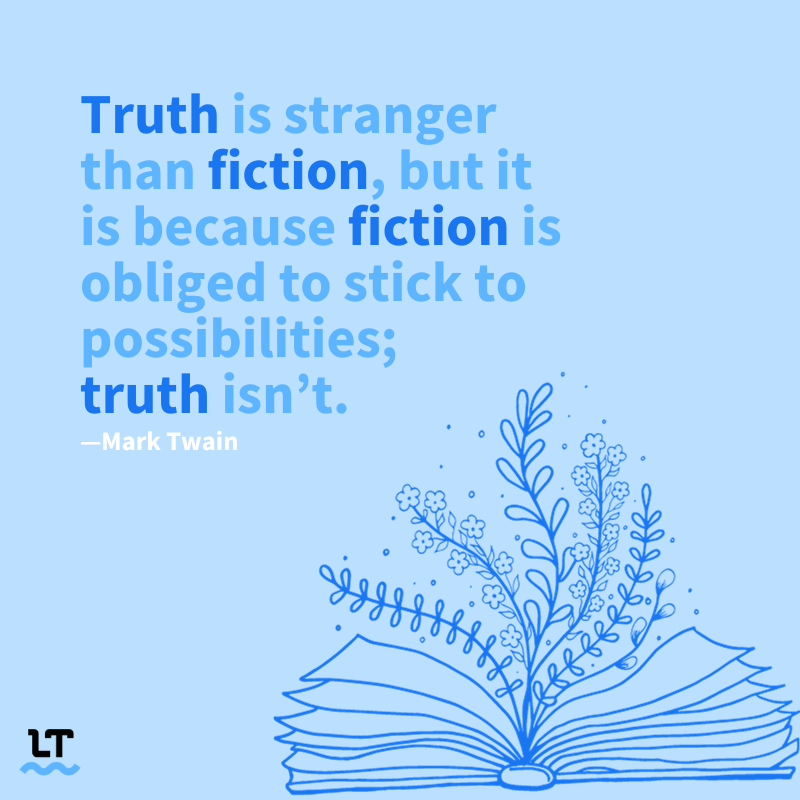What’s the Difference Between “Fiction” and “Nonfiction”?
Fiction refers to “something created in the imagination.” Therefore, fictional writing is based on events that the author made up rather than real ones. Nonfiction is “writing that revolves around facts, real people, and events that actually occurred.”
Table of Contents
What Does “Fiction” Mean? (With Examples)
An artist discerns subtle brushstrokes that look identical to the average person. They can also recognize hundreds of colors by their names. Similarly, as writers, we must be familiar with distinct types of prose, with the foundation of that knowledge being the ability to differentiate between fiction and nonfiction.
If you’ve ever been uncertain about these terms, you’re in the right place. We’ll help you get a solid grasp of what fiction and nonfiction mean by providing clear explanations and examples.
Let’s dive in!
What Does “Fiction” Mean? (With Examples)
Fiction is “written work that is invented or created in the mind.” Put differently, the narrative is imaginary and didn’t actually happen. Novels, short stories, epic poems, plays, and comic books are a few types of fiction writing.
Examples of famous fiction literature include:
Alice in Wonderland by Lewis Carroll
Animal Farm by George Orwell
Fahrenheit 451 by Ray Bradbury
The Harry Potter Series by J.K. Rowling
Don Quixote de la Mancha by Miguel de Cervantes
Fiction can read like this:
On my way to the city of Bolognaland, I noticed that my water-fueled flying car was running low on energy. So, I stopped by the water station and filled up the tank. There, I saw the most beautiful sunset of green, turquoise, and black. As the sun set below the horizon, the two
moons—Luminara and Crescelia—took their place in the night sky.
To the best of our knowledge, every single aspect of the story written above is imaginary, from Bolognaland to the two moons. However, it’s important to note that not every component of a fictional story has to be created out of thin air. For example, someone could come up with a tale about a man who grew up in Cleveland, Ohio, which is an actual place in the United States. A fictional story can incorporate many components that are nonfiction.
The word fiction isn’t always used to describe a type of literature; it can also refer to anything false.
Don’t believe anything he says—it’s all fiction!
The legend of the hidden treasure has been passed down in this family for generations, but most of us think it’s fiction.
A main part of my job as a historian is to separate fact from fiction in ancient manuscripts.
“Fictional” vs. “Fictitious”
Fictional and fictitious both relate to things or people that are made up and are often used interchangeably. However, fictional typically describes something that originates from literature, movies, or other forms of storytelling, and fictitious can refer to something that is false and intended to deceive. In other words, it carries more of a negative connotation.

What Does “Nonfiction” Mean?
Nonfiction refers to “literature that is based on facts, real events, and real people.” Nonfiction writers aim to compose everything as truthfully and accurately as possible. However, sometimes authors enhance certain parts to make them more interesting, or they are required to change specific facts, like names, for privacy reasons.
Memoirs, biographies, articles, essays, and even personal journal entries are a few types of nonfiction texts.
A few examples of famous published nonfiction works include:
Elon Musk by Walter Isaacson
When Breath Becomes Air by Paul Kalanithi
The Diary of a Young Girl by Anne Frank
Educated by Tara Westover
The Hidden Life of Trees by Peter Wohlleben
Here’s a piece of nonfiction text:
Elon Musk was born in Pretoria, South Africa on June 28, 1971. His mother is Maye Musk, and his father is Errol Musk. Musk has two siblings, a younger brother named Kimbal and a younger sister named Tosca.
This text is accurate and based on facts; therefore, it is considered nonfiction. But please note that it is not exemplary of nonfiction works—they’re not all boring, rigid, and monotonous. Skilled nonfiction writers weave rhetorical devices, interesting facts, and more to keep readers engaged.
Is it “Nonfiction” or “Non-Fiction”?
This word can be spelled as a hyphenated (non-fiction) or non-hyphenated (nonfiction) compound word. The spelling depends on which English dialect you’re writing in.
In American English, nonfiction is more commonly used. Both forms are found in British English, but non-fiction is slightly more prevalent.

How To Write Fictional and Nonfictional Masterpieces
We should reiterate that fiction and nonfiction writing can overlap. That means that some fiction includes components of nonfiction and vice versa.
What’s vital to remember is that fiction writing is mostly made up of fabricated stories, whereas nonfiction writing is mostly composed of the truth.
Written masterpieces can be found in all genres, including fiction and nonfiction. When it’s time for you to work on yours, make sure you entrust LanguageTool as your writing assistant. As a multilingual, AI-driven, spell, grammar, and punctuation checker, LanguageTool rids your texts of various types of errors while ensuring you stay productive to reach your goals.
Give it a try today to start writing like the legends!

